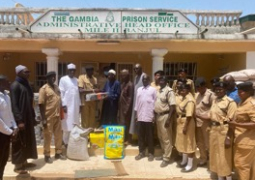
With funding from the World Bank through the Gambia Fiscal Management Development Project under the Ministry of Finance,
the GPPA convened the validation following the completion of the e-GP Regulations document, a crucial step towards modernising procurement practice in The Gambia.
With this development, The Gambia now joins Rwanda, Ghana and Tunisia, who have already implemented these e-GP regulations.
The event, also forms part of the authority’s commitment to transparency, efficiency and effectiveness in public procurement.
At the opening, Bai Ibrahim Jobe, representing chairman of the board of directors of GPPA, described the event as a significant journey towards the modernisation of procurement practices in the country.
“I would like to express sincere gratitude to World Bank for their unwavering support to the procurement reforms initiative as evident in the financing through The Gambia Fiscal Management and Development Project under the Ministry of Finance,” Mr Jobe said.
He lauded this partnership as instrumental in advancing the country efforts to enhance transparency, efficiency and effectiveness in public procurement.
“Today marks another significant milestone in our quest for procurement excellence,” he said, adding: “The e-GP Regulations document and methodology prepared by our dedicated team and consulting firm represents a comprehensive framework that seeks to harness the power of digital technology to revolutionise procurement practice and processes in the country.”
Ibrahim Sanyang, Director of Procurement Policy and Operations at GPPA, said the journey to revolutionise public procurement through the adaptation of e-Government Procurement practices in the country started some 23 years ago, since the inception of the authority.
“Although, the original Public Procurement Act 2001 and its attendant regulations 2003 changed several times, the quest for the Authority to examine and recommend ways of introducing in public procurement, the use of ITC and other technical innovations, a code in all the subsequent editions.”
That, he added, simply suggests that the authority has a legal backing to develop an e-GP system which he said, among other things will create efficiency and effectively increase transparency, thus minimising corruption in line with the prioritised objectives of the National Development Plans.
“As we set forth on the journey, the authority wants the best for the country. Hence, we embarked on several activities including study tours to Rwanda, Nigeria and Ghana respectively, to benchmark best practice and identify the best system suitable for The Gambia.”
To that end, Sanyang revealed that different consultants were hired to conduct different assignments including an e-GP Readiness Assessment, preparation of an e-GP Roadmap and Strategy, preparation of e-GP Policy Manuals, Forms and Templates, among a host of others.
He expressed gratitude to the World Bank for funding the project through The Gambia Fiscal Management Development Project under the Ministry of Finance.
Phoday M. Jaiteh, Director General of GPPA, said the move is another step in the right direction and towards meeting their strategic goals of the digitalisation of the country’s procurement system.
“This event marks another significant milestone in our journey towards enhancing transparency, efficiency and accountability in public procurement processes. Through the World Bank, the GPPA has been able to develop many of the legislative, administrative and policy documents to ensure a smooth implementation of an effective e-procurement system for The Gambia.”
Jaiteh added that the draft e-GP Regulations went through a rigorous consultation with all stakeholders both public and private, further thanking its line Ministries of Finance, Communication as well as Gambia Revenue Authority and The Gambia Information and Communication Technology Agency for their outstanding support during their quest to develop the document.
The adoption of e-procurement system, he added, is a crucial step towards modernising the country’s procurement practices by aligning them with international standards.
Lamin Camara, Permanent Secretary at the Ministry of Communication and Digital Economy, expressed gratitude to the participants for their commitment towards digital transformation of public procurement in the country.
PS Camara reminded that at the Ministry their job is to ensure they streamline ICT in all public service delivery systems, saying in doing so, they don’t provide all the services but collaborate with other government institutions to do so.
While describing GPPA as one of their reliable partners, PS Camara acknowledged that they’ve been working closely with the authority in achieving that objective.
Mamadi Dampha, Deputy Permanent Secretary at the Ministry of Finance and Economic Affairs, representing PS of the said Ministry, expressed sincere appreciation to GPPA for their tireless efforts in spearheading the initiative and to World Bank for their generous support through The Gambia Fiscal Management Development Project under the Ministry of Finance.
“Your dedication and collaboration have been instrumental in bringing us to this pivotal milestone. The e-GP Regulations represents a significant lead forward in our journey towards modernising public procurement in the country.”
By embracing digital technology, DPS Dampha, believes the country will have the opportunity to leverage and enhance transparency, efficiency, accountability in public procurement, which he added, will ultimately lead to improved service delivery and better outcomes for the citizens.
Paul Kalumba, a World Bank consultant, also spoke at the event.
Read Other Articles In Headlines
TRRC submits interim report to gov’t
Apr 30, 2020, 1:35 PM




